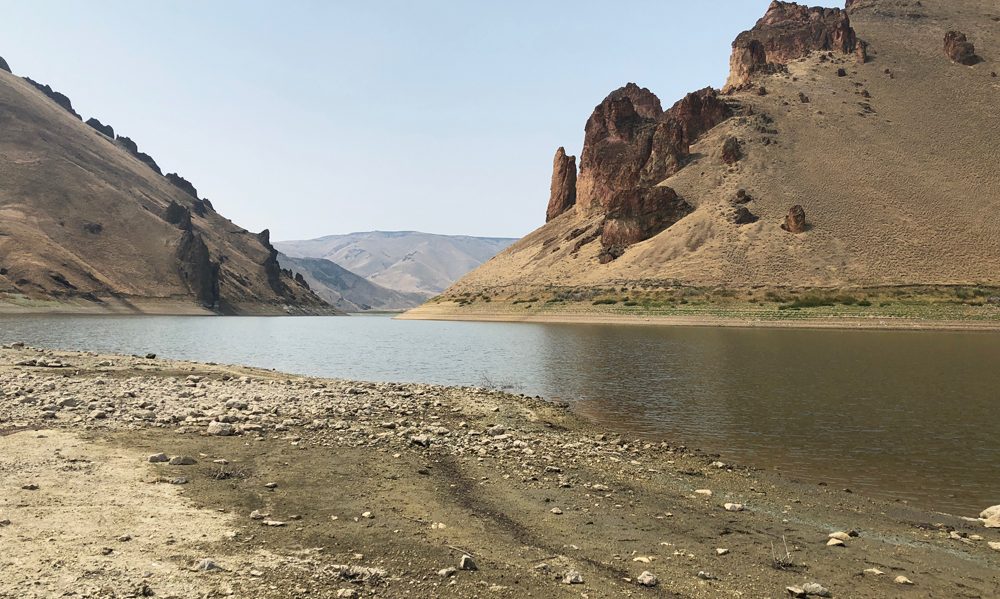 Area reservoirs, like the Owyhee (above), are running low, potentially creating serious challenges for Malheur County’s agriculture industry in the coming years. (The Enterprise/File)
Area reservoirs, like the Owyhee (above), are running low, potentially creating serious challenges for Malheur County’s agriculture industry in the coming years. (The Enterprise/File)
Low water levels in Malheur County reservoirs could be marked with a big red sign: WARNING. There is danger to the agricultural economy in this status, but there also is good reason to worry this will be happening more often. A federal report recently released dealing with climate change carries potent messages for our community.
The climate change report is not exactly bedtime reading, going on for hundreds and hundreds of pages. The report, the product of work by several federal agencies, is detailed and provides an exhaustive list of sources. An entire segment – Chapter 24 – addresses the climate future in the Northwest. It’s a scary tale.
You may have missed the report because it was issued the day after Thanksgiving. President Trump has been dismissive of its findings, but it is his administration and his agencies that issued the report. The findings appear credible – and well worth your time to consider. Malheur County can’t afford to ignore the environmental risks called out in this report.
The low snowpack we have so far? Consider what happened in 2015, with a record-setting drought in the West. That “led to water scarcity and large wildfires that negatively affected farmers, hydropower, drinking water, air quality, salmon and recreation.” There isn’t a soul in Malheur County beyond the reach of those effects.
The report warns that warmer summers mean less forage and less quality: “Impacts to the quality and quantity of forage will also likely impact farmers’ economic viability as they may need to buy additional feed or wait longer for their livestock to put on weight, which affects the total price they receive per animal.”
The report said livestock production costs are likely to go up because of extra feed, the need to water, and “the need for reducing livestock numbers in response to warmer and drier summers.”
Our crop growers don’t escape menace from possible climate changes. The report is blunt in assessing the risk to those who work the fields. “Agricultural workers are at increased risks for heat-related injuries because they work outside during the summer harvest season,” the report said. Those workers “are vital to the region, yet they often earn very low wages and face discrimination and workplace hazards,” the report said, noting they often can’t get health care they need.
But there is more than economics at stake. The federal experts warn that more species could become endangered or go extinct, and that could pose fresh challenges for managing streams and the range. The report said recreation – the joy of being outdoors – could be impaired as well as the planet warms.
And one of the most startling warnings is this: The report indicates that as challenging as the climate may become in the Northwest, the impacts will be far worse in other parts of the country. That could put people on the move – towards us. “Displacement and increased migration to the Northwest could place increasing pressures on housing markets, infrastructure, and health and social service systems,” the report said.
Studies, as they say, are a dime a dozen, but going ostrich in reaction to this one isn’t sensible. Sure, the report may be wrong – or exaggerate the risks. Yet our community can take smart steps that improve life now and could set us ahead if the warnings become realities.
We should, for instance, continue to focus on managing water resources. Several agencies, from the irrigation districts to the Malheur Watershed Council, already invest time and money in sharpening how we use money to get the most out of every drop – and conserve where we can. That work will continue, but local experts in such agencies ought to keep the public aware of their own assessments of climate change. The rest of us need to know when to act.
We can, and should, do more to take better care of our farm workers. Some employers are diligent and responsible, understanding the value of a healthy and committed work force. Others, however, see these laborers as just human widgets, replaceable at low cost and with ease. All of us have to be on guard against that sort of attitude and support measures that give workers their fair due in pay, housing, and health care.
Debate climate change if you will, but don’t let argument crowd out sensible steps we ought to be taking regardless.
– LZ




